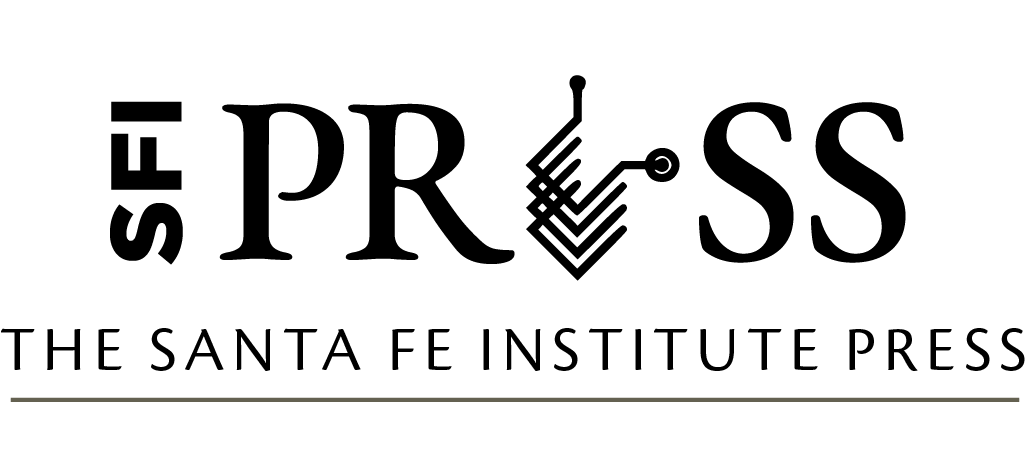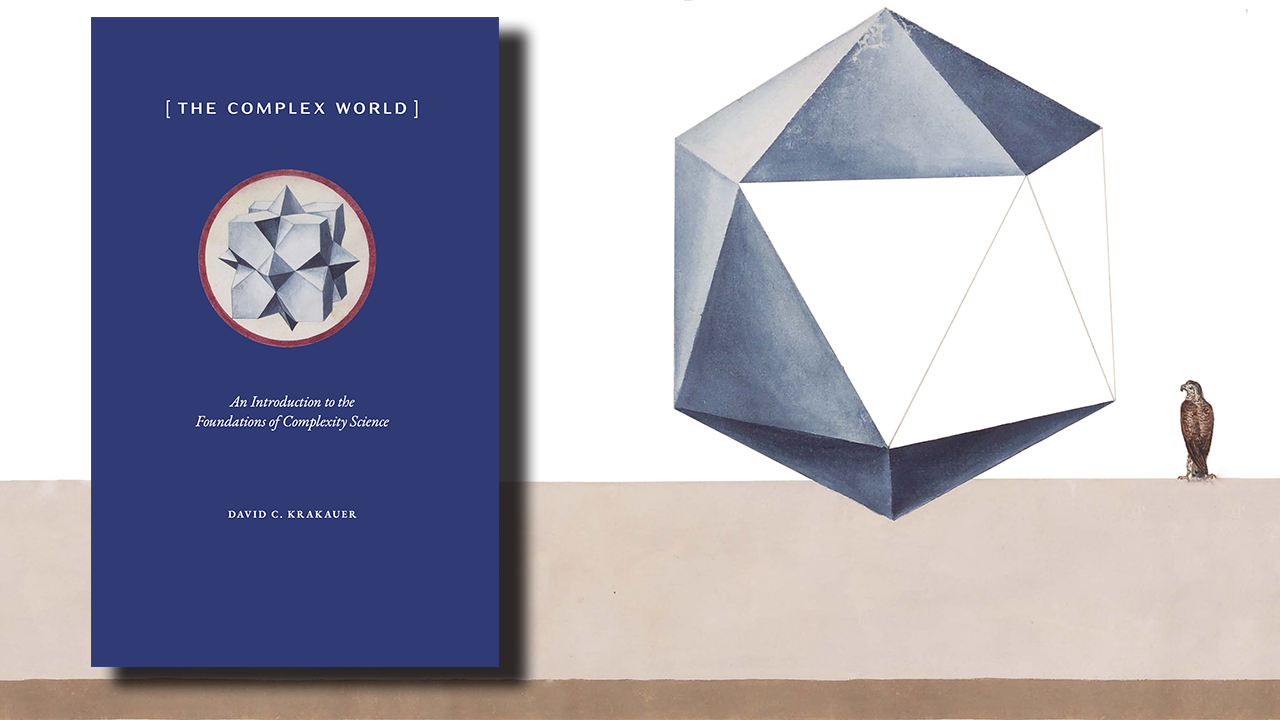Foundational Papers in Complexity Science


Foundational Papers in Complexity Science
Foundational Papers in Complexity Science presents the first unified charting of the full territory of complexity science—an essential resource for navigating the modern world.
This project maps the development of complex-systems science through eighty-nine revolutionary works originally published between 1922 and 2000. Curated by SFI President David C. Krakauer, each seminal paper is introduced and placed into its historical context, with enduring insights discussed by leading contemporary complexity scientists.
These four volumes are a product of collective intelligence. More than a compilation, Foundational Papers represents large-scale collaboration within the SFI community—brilliant thinkers who have contextualized the work that shaped their own research, resulting in a sparkling demonstration of how complexity shatters the usual scientific divisions and a look back at the path we’ve followed in order to gain a clearer view of what lies ahead.
Volume I spans the turbulent years from 1922 to 1962. Across several decades of war, runaway technological invention, and economic upheaval, complexity science emerges through the integration of ideas from evolution, computation, dynamics, and statistical physics.
Volume 2 examines the utopian–dystopian years from 1962 to 1973: a decade of global instability, social revolution, space exploration, and growing ecological awareness. Complexity science challenges our understanding of prediction, control, and uncertainty.
Volume 3 describes the maturing of complexity science in the age of democratized computing. Mini-computers and personal computers supporting computer graphics, simulation environments, and numerical mathematics, intersect with nonlinear dynamics, evolutionary theory, and statistical physics. This culminates in new models and theories—from autopoiesis to synergetics, cellular automata to agent-based models—and their many applications, including ecological resilience, complex materials, the origin of life, and climate dynamics.
Volume 4 marks the era of the global internet, ubiquitous computing, and multiple network revolutions. As complexity science matures, unifying frameworks emerge, including connectionism, scaling theory, new models and theories of transmission and contagion, and various forms of biologically inspired computing. The application of mechanisms of decentralized knowledge production to society and culture transforms our understanding of socio-economic and cultural systems.
Donate
Make a donation to the Santa Fe Institute and we’ll say “thanks!” with an electronic version (PDF and, for some titles, MOBI and ePub) of your choice of SFI Press book. Please note: Due to the prohibitive cost of electronic reprint rights, Foundational Papers in Complexity Science is not available in eBook or PDF format.
Editor
Table of Contents
VOLUME 1
Introduction
David C. Krakauer
Luís Bettencourt: Maximum Power as a Physical Principle of Evolution
A. J. Lotka, “Contribution to the Energetics of Evolution” (1922)Susanne Still: To Work is to Think
L. Szilárd, “On the Decrease of Entropy in a Thermodynamic System by the Intervention of Intelligent Beings” (1929)Sergey Gavrilets: Navigating the Landscape of Complexity: Sewall Wright’s Seminal Contributions and their Far-Reaching Impact
S. Wright, “The Roles of Mutation, Inbreeding, Crossbreeding, and Selection in Evolution” (1932)Walter Fontana: The Shadow of a Mechanism
C. H. Waddington, Canalization of Development and the Inheritance of Acquired Characters (1942)Bruno Olshausen and Christopher Hillar: The Genesis of Modern Computing and AI
W. S. McCulloch and W. Pitts, “A Logical Calculus of the Ideas Immanent in Nervous Activity” (1943)Andrew Pickering: The Birth of Cybernetics
A. Rosenblueth, N. Wiener, and J. Bigelow, “Behavior, Purpose, and Teleology” (1943)Samuel Bowles: Friedrich Hayek’s Economy of Knowledge
F. A. Hayek, “The Use of Knowledge in Society” (1945)Cosma Rohilla Shalizi: Opening a Closed Box
A. Rosenblueth and N. Wiener, “The Role of Models in Science” (1945)Seth Lloyd: From the Analog to the Digital
C. E. Shannon, “A Mathematical Theory of Communication” (1948)Stuart Kauffman: If, and, If So, How?
W. Weaver, “Science and Complexity” (1948)Daniel Dennett: Turing’s Brainchild: Artificial Intelligence
A. M. Turing, “Computing Machinery and Intelligence” (1950)Robert L. Axtell: The Nash Equilibrium
J. Nash, “Non-Cooperative Games” (1951)Karen Page: Do Turing Patterns Provide a Chemical Basis of Morphogenesis?
A. M. Turing, “The Chemical Basis of Morphogenesis” (1952)Dawn E. Holmes: Jaynes and the Principle of Maximum Entropy
E. T. Jaynes, “Information Theory and Statistical Mechanics” (1957)Maxim Raginsky: The State–Space Revolution in the Study of Complex Systems
R. E. Kálmán, “Contributions to the Theory of Optimal Control” (1960)David H. Wolpert: The Relationship between Physics and Computation: The Minimal Thermodynamic Cost of to Erase a Bit
R. Landauer, “Irreversibility and Heat Generation in the Computing Process” (1961)Melanie Mitchell: Symbols versus Cybernetics: Marvin Minsky on the Prospects for Artificial Intelligence
M. Minsky, “Steps Toward Artificial Intelligence” (1961)John Geanakoplos: Arrow’s ‘Learning by Doing’ and Complexity Economics
K. J. Arrow, “The Economic Implications of Learning by Doing” (1962)David C. Krakauer: The Unstable Foundations of Simplicity
M. Bunge, “The Complexity of Simplicity” (1962)John H. Miller: Mastering the Glass Bead Game
J. H. Holland, “Outline for a Logical Theory of Adaptive Systems” (1962)
VOLUME 2Simon A. Levin: The Architect of Complexity
H. A. Simon, “The Architecture of Complexity” (1962)Erica Jen: Café Roots & Fruits
S. Ulam, “On Some Mathematical Problems Connected with Patterns of Growth in Figures” (1962)J. Doyne Farmer: The Revolutionary Discovery of Chaos
E. N. Lorenz, “Deterministic Nonperiodic Flow” (1963)Cristopher Moore: Easy vs. Hard: The Dawn of Computational Complexity
A. Cobham, “The Intrinsic Computational Difficulty of Functions” (1964)Paul M.B. Vitányi: A General System for Machine Learning
R. J. Solomonoff, “A Formal Theory of Inductive Inference, Part 1” (1964)Simon DeDeo: Portrait of the Artist as a Young Complexity Hacker
G. J. Chaitin, “On the Length of Programs for Computing Finite Binary Sequences” (1966)Ricard Solé: Morphospaces, the Possible, and the Actual
D. M. Raup, “Geometric Analysis of Shell Coiling; General Problems” (1966)Neil Gershenfeld: Self-Reproducing Ideas
J. von Neumann, “Theory of Self-Reproducing Automata” (1966)Geoffrey B. West: Fractals, Self-Similarity, and Power Laws
B. B. Mandelbrot, “How Long is the Coast of Britain? Statistical Self-Similarity and Fractional Dimension” (1967)Carl T. Bergstrom and Michael Lachmann: Origins of the Neutral Theory
M. Kimura, “Evolutionary Rate at the Molecular Level” (1968)Simon DeDeo: Inspiring, Enigmatic, Incomplete
A. N. Kolmogorov, “Three Approaches to the Quantitative Definition of Information” (1968)Daniel P. Schrag, A Faulty Foundation Supports a Powerful Idea: Mikhail Budyko and His Work on the Ice–Albedo Feedback
M. I. Budyko, “The Effect of Solar Radiation Variations on the Climate of the Earth” (1969)Sanjay Jain: Attractors of a Random Networked Dynamical System Have Something to Say about Life
S. Kauffman, “Metabolic Stability and Epigenesis in Randomly Constructed Genetic Nets” (1969)James P. Crutchfield: Requisite Complexity—A Contemporary View of Cybernetic Control and Communication
R. C. Conant and W. R. Ashby, “Every Good Regulator of a System Must Be a Model of That System” (1970)Michael Lachmann: The Price Equation: The Mathematical Basis of Evolutionary Theory?
G. R. Price, “Selection and Covariance”Philipp Honegger and Walter Fontana: The Wheels of Chemistry
O. E. Rössler, “A System–Theoretic Model of Biogenesis (Ein systemtheoretisches Modell zur Biogenese)” (1971)H. Peyton Young: Tipping Points: Schelling’s Account of Sorting and Segregation
T. C. Schelling, “Dynamic Models of Segregation” (1971)Timothy A. Kohler: Prehistory in the Land of Malthus
E. B. W. Zubrow, “Carrying Capacity and Dynamic Equilibrium in the Prehistoric Southwest” (1971)Tanmoy Bhattacharya: Rise of Complexity Sciences in a Reductionist World
P. W. Anderson, “More Is Different” (1972)Cristopher Moore: Gardens of Forking Paths: Exponential Hardness and Exhaustive Search
R. M. Karp, “Reducibility Among Combinatorial Problems” (1972)Jennifer A. Dunne: Diversity/Complexity/Stability
R. M. May, “Will a Large Complex System Be Stable?” (1972)Manfred Laubichler: The Deep Co-Evolutionary Roots of Complexity
H. von Foerster, “Notes on an Epistemology for Living Things” (1972)Jon Machta: The Energy Cost of Computing
C. H. Bennett, “Logical Reversibility of Computation” (1973)Duncan Watts: Weak Ties and the Origins of Network Science
M. S. Granovetter, “The Strength of Weak Ties” (1973)
VOLUME 3Van Savage: Resilience Redounding
C. S. Holling, “Resilience and Stability of Ecological Systems” (1973)John Kaag: The Organization of the Organization of Complex Systems
H. A. Simon, “The Organization of Complex Systems” (1973)Karl Sigmund: The Emergence of Evolutionary Stability
J. Maynard Smith, “The Theory of Games and the Evolution of Animal Conflicts” (1974)Randall D. Beer: A Factory that Makes Itself
F. G. Varela, H. R. Maturana, and R. Uribe, “Autopoiesis: The Organization of Living Systems, Its Characterization, and a Model” (1974)Sid Redner: On the Simplest (and Perhaps Too Simple) Solvable Model of a Spin Glass
D. Sherrington and S. Kirkpatrick, “Solvable Model of a Spin-Glass” (1975)Axel Hutt: Synergetics: The Doctrine of Interaction
H. Haken, “Synergetics” (1976)Nicholas W. Watkins: Brownian Motion as Mathematical Superstructure to Organize the Science of Climate and Weather
K. Hasselmann, “Stochastic Climate Models Part I. Theory” (1976)Douglas H. Erwin: Punctuation and Discontinuities: A New View of History (?)
S. J. Gould and N. Eldredge, “Punctuated Equilibria: The Tempo and Mode of Evolution Reconsidered” (1977)Daniel L. Stein: Spin Glasses, Disordered Systems, and Complexity
G. Parisi: Infinite Number of Order Parameters for Spin-Glasses (1979)Neil Gershenfeld: Finding Hidden Meaning
N. H. Packard, J. P. Crutchfield, J. D. Farmer, and R. S. Shaw, “Geometry from a Time Series” (1980)Michael E. Hochberg: Complexity in the Evolution of Cooperation
R. Axelrod and W. D. Hamilton, “The Evolution of Cooperation” (1981)D. Eric Smith: Small Molecule Self-Organization before Genes
F. J. Dyson, “A Model for the Origin of Life” (1982)David Sherrington: Attractor Neural Networks
J. J. Hopfield, “Neural Networks and Physical Systems with Emergent Collective Computational Abilities” (1982)Elizabeth Bradley: Universality in Nonlinear Dynamical Systems
M. J. Feigenbaum, “Universal Behavior in Nonlinear Systems” (1983)Hector Zenil: The Emergent Behavior of Computer Programs of Short Description Length in Discrete Time and Discrete Space
S. Wolfram, “Universality and Complexity in Cellular Automata (1984)Stefan Thurner: Irreversible, Nonlinear, Stochastic Systems
I. Prigogine and G. Nicolis, “Self-Organisation in Nonequilibrium Systems: Towards a Dynamics of Complexity” (1985)Sara Imari Walker: Simulating Life
C. G. Langton, “Studying Artificial Life with Cellular Automata” (1986)David Kinney: Causal Structures for Evidential Reasoning
J. Pearl, “Fusion, Propagation, and Structuring in Belief Networks” (1986)Gunnar Pruessner: The Physics of Fractals
P. Bak, C. Tang, and K. Wiesenfeld, “Self-Organized Criticality: An Explanation of the 1/f Noise” (1987)Christoph Adami: Tripping the Walks Fantastic
S. Kauffman and S. Levin, “Towards a General Theory of Adaptive Walks on Rugged Landscapes” (1987)Robert L. Axtell: Simple Agents and the Emergence of Complex Behaviors
C. Reynolds, “Flocks, Heres, and Schools: A Distributed Behavioral Model” (1987)David C. Krakauer: The Evolutionary Cloud in Sequence Space
M. Eigen, J. McCaskill, and P. Schuster, “Molecular Quasi-Species” (1988)
VOLUME 4Scott E. Page: Competing Technologies, Increasing Returns, and Lock-In
W. B. Arthur, “Competing Technologies, Increasing Returns, and Lock-In by Historical Events” (1989)Rob J. de Boer: Immune Network Theory: A Retrospective
A. S. Perelson, “Immune Network Theory” (1989)
Stephanie Forrest: Connecting Connectionist Models
J. D. Farmer, “A Rosetta Stone for Connectionism” (1990)
Jessica C. Flack: And It Is All One to Me
J. A. Wheeler, “Information, Physics, Quantum: The Search for Links” (1989)
Vijay Balasubramanian: What a Neuron Says and How It Says It
W. Bialek, F. Rieke, R. de Ruyter van Steveninck, and D. Warland, “Reading a Neural Code” (1991)
Richard Bookstaber: Economics for Humans
J. H. Holland and J. H. Miller, “Artificial Adaptive Agents in Economic Theory” (1991)
W. Brian Arthur: Simple Dynamics with Rich Implications
K. Lindgren, “Evolutionary Phenomena in Simple Dynamics” (1991)
Suresh Naidu: What Simon Says: Introducing Organizations and Markets
H. A. Simon, “Organizations and Markets” (1991)
Mirta Galesic: Evolving Centralized Institutions from the Bottom Up
J. S. Lansing and J. N. Kremer, “Emergent Properties of Balinese Water Temple Networks: Coadaptation on a Rugged Fitness Landscape” (1993)
David H. Ackley: Life and Computation: From Statistical Physics to Emergent Physics
M. Mitchell, P. T. Hraber, and J. P. Crutchfield, “Revisiting the Edge of Chaos: Evolving Cellular Automata to Perform Computations” (1993)
Willemien Kets: The Costs of Miscoordination
W. B. Arthur, “Inductive Reasoning and Bounded Rationality” (1994)
Peter M. A. Sloot, Rick Quax, and Mile Gu: Natural Information Processing
J. P. Crutchfield, “The Calculi of Emergence: Computation: Dynamics, and Induction” (1994)
Anil Somayaji: Learning from the Immune System
S. Forrest, A. S. Perelson, L. Allen, and R. Cherukuri, “Self–Nonself Discrimination in a Computer” (1994)
Evandro Ferrada: The Architecture of Genotype–Phenotype Maps
P. Schuster, W. Fontana, P. F. Stadler, and I. L. Hofacker, “From Sequences to Shapes and Back: A Case Study in RNA Secondary Structures” (1994)
Miguel Fuentes: Characterization of Complex Systems and the Evolution of Scientific Theories
M. Gell-Mann and S. Lloyd, “Information Measures, Effective Complexity, and Total Information” (1996)
David C. Krakauer: The Evolution of Selection
F. J. Odling-Smee, K. N. Laland, and M. W. Feldman, “Niche Construction” (1996)
Pablo Marquet: Quarter-Power Allometric Scaling and Life Dynamics
G. B. West, J. H. Brown, and B. J. Enquist, “A General Model for the Origin of Allometric Scaling Laws in Biology” (1997)
Charlie Strauss and Vijay Balasubramanian: No Free Lunch
D. H. Wolpert and W. G. Macready, “No Free Lunch Theorems for Optimization” (1997)
Nihat Ay: From the Euclidean to the Natural
S.-I. Amari, “Natural Gradient Works Efficiently in Learning (1998)
Rajiv Sethi: Sam Bowles on Endogenous Preferences
S. Bowles, “Endogenous Preferences: The Cultural Consequences of Markets and Other Economic Institutions” (1998)
Michelle Girvan: How the Small-World Model Transformed How We Think about Connectivity
D. J. Watts and S. H. Strogatz, “Collective Dynamics of ‘Small-World’ Networks” (1998)
Christopher P. Kempes: Mesocosmos: In Search of Universal Laws of Living Material
R. B. Laughlin, D. Pines, J. Schmalian, B. P. Stojković, and P. Wolynes, “The Middle Way” (2000)
John M. Anderies: Collective Action & the Dynamics of Institutions
E. Ostrom, “Collective Action and the Evolution of Social Norms” (2000)
News
Citation Information
Book: Foundational Papers in Complexity Science
Edited by David C. Krakauer
Publisher and imprint: The SFI Press Scholars Series
Volume I (808 pages)
Publication Date: April 26, 2024
ISBN: 978-1-947864-56-6 (Paperback),
978-1-947864-52-8 (Hardcover)
$24.99 (Paperback), $39.99 (Hardcover)
Volume 2 (692 pages)
Publication Date: April 26, 2024
ISBN: 978-1-947864-57-3 (Paperback),
978-1-947864-53-5 (Hardcover)
$21.99 (Paperback), $34.99 (Hardcover)
Volume 3 (774 pages)
Publication Date: September 26, 2024
ISBN: 978-1-947864-58-0 (Paperback),
978-1-947864-54-2 (Hardcover)
$24.99 (Paperback), $39.99 (Hardcover)
Volume 4 (828 pages)
Publication Date: December 19, 2024
ISBN: 978-1-947864-59-7 (Paperback),
978-1-947864-55-9 (Hardcover)
$25.99 (Paperback), hardcover forthcoming





